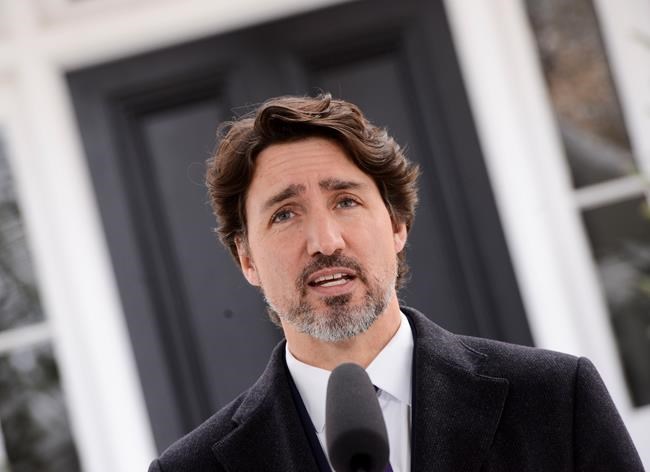Ontario, Quebec offer different plans for reopening; Trudeau will not dictate
Advertisement
Read this article for free:
or
Already have an account? Log in here »
To continue reading, please subscribe:
Monthly Digital Subscription
$0 for the first 4 weeks*
- Enjoy unlimited reading on winnipegfreepress.com
- Read the E-Edition, our digital replica newspaper
- Access News Break, our award-winning app
- Play interactive puzzles
*No charge for 4 weeks then price increases to the regular rate of $19.00 plus GST every four weeks. Offer available to new and qualified returning subscribers only. Cancel any time.
Monthly Digital Subscription
$4.75/week*
- Enjoy unlimited reading on winnipegfreepress.com
- Read the E-Edition, our digital replica newspaper
- Access News Break, our award-winning app
- Play interactive puzzles
*Billed as $19 plus GST every four weeks. Cancel any time.
To continue reading, please subscribe:
Add Free Press access to your Brandon Sun subscription for only an additional
$1 for the first 4 weeks*
*Your next subscription payment will increase by $1.00 and you will be charged $16.99 plus GST for four weeks. After four weeks, your payment will increase to $23.99 plus GST every four weeks.
Read unlimited articles for free today:
or
Already have an account? Log in here »
Hey there, time traveller!
This article was published 27/04/2020 (2056 days ago), so information in it may no longer be current.
Prime Minister Justin Trudeau said Monday that Ottawa will help guide, but not dictate, how provinces and territories should start easing COVID-19 restrictions as Canada’s two hardest-hit regions offered up starkly different plans for loosening the rules.
Ontario and Quebec together account for more than 80 per cent of the more than 48,000 cases of COVID-19 in the country.
Quebec came forward with a plan that would see some students back in the classroom by the middle of May, while the Ontario government outlined a three-stage approach to reopening that province’s economy, but without any timelines.
“No one wants the economy to open up more than I do, but we can’t take anything for granted,” Premier Doug Ford said. He noted that all it takes is one infected person to spread the virus to hundreds of others.
The first stage of Ontario’s plan includes opening some workplaces and parks, allowing more people at events such as funerals and resuming non-urgent surgeries.
The second stage includes opening more businesses and outdoor spaces and allowing larger public gatherings.
The third stage would see all workplaces resume activities and further relax rules on public gatherings. Big concerts and sporting events would still be restricted.
“I don’t believe when sports come back they’re going to come back with a full stadium anywhere in North America,” Ford said.
When asked whether there would ever be a complete return to normal, he said: “I don’t think it will ever go back to where it was before, because our lives have changed and we’re doing things differently.”
Ford’s government announced on the weekend that publicly funded schools are to stay closed until at least May 31.
Ontario reported 424 new COVID-19 cases and 57 more deaths. While that was a nearly three per cent increase over Sunday, the province has seen declining growth rates over the last several days.
Overall, there have been 892 deaths in a total of 14,856 cases, with 8,525 of those resolved.
“Progress doesn’t mean we can quit now,” Ford said. “That’s why I won’t set hard dates until we’re ready, because the virus travels at its own speed.”
The Quebec government announced plans to reopen elementary schools and daycares in the Montreal area on May 19 and a week earlier elsewhere. High schools, junior colleges and universities are to remain closed until September.
Premier Francois Legault said he doesn’t expect a vaccine for at least another year and kids can’t stay home that long.
“Life has to continue,” he said. “It’s good for kids to see their friends, their teachers.”
Quebec was to present its economic reopening plans on Tuesday.
There were 84 more COVID-19 deaths in Quebec on Monday for a total of 1,599. Seventy five of those new deaths were in long-term care centres There were 875 new cases of COVID for a total of 24,982.

Saskatchewan, Prince Edward Island and New Brunswick have already announced tentative reopening timelines. Manitoba has said it will announce its plans later this week.
Trudeau said he has full confidence that Canada’s premiers will do what’s right and don’t need the federal government to oversee matters under provincial jurisdiction.
He said Ottawa has been helping develop guidelines on matters such as ensuring provinces have enough medical capacity and enough testing.
The prime minister said the government wouldn’t impose the guidelines, but that he and all 13 premiers would work on them together.
Trudeau cautioned that a complete return to normal is a long way off and governments will have to be careful until there is a vaccine for COVID-19 or a treatment to make it less deadly.
“That caution will remain because at any time if we loosen our measures too much, we can find ourselves back in a tremendous spike,” he said.
“Historians remember from the 1918 Spanish Flu epidemic that the spring was pretty bad, but the fall was much worse. We need to stay vigilant every step of the way.”
Also Monday, businesses began applying for the federal government’s $73-billion wage subsidy program. Trudeau said 10,000 applications had been received in the first few hours.
Companies that qualify will get a subsidy worth 75 per cent of each employee’s wages, up to $847 a week, retroactive to mid-March.
Trudeau said money under the program is to start flowing by May 7.
This report by The Canadian Press was first published April 27, 2020
— With files from Lee Berthiaume in Ottawa, Allison Jones in Toronto and Guiseppe Valiante in Montreal



